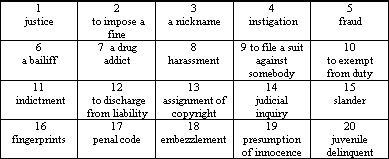A Learner-Centred Approach to Vocabulary Review Using Bingo
Galina Kavaliauskienëukk [at] lta.lt
Department of Foreign Languages
Law Academy, Ateities 20, Vilnius 2057, Lithuania
The game Bingo is a useful vocabulary consolidation technique which caters to the learners at the intermediate level and above. It is an ideal tool in assessing or teaching English for Specific Purposes (ESP), such as law, business, economics and science, and may also be used for the same purpose in teaching general English.
The idea is very simple: to make one master chart of a desired number of vocabulary items (nouns, verbs, collocations, etc.) and their definitions, and some students' cards. The number n of students' cards depends on the number N of students in the group. If students are to work in pairs, you will need n = (N/2) -1 cards, if you prefer them working in groups of 3, n = (N/3) - 1. For example, if there are 16 students in a group, you will need n = (16/2) - 1 = 7 students' cards.
The major point is that it is not the teacher who does all the preparation work and conducts the activity, but the students themselves, hence it is a learner-centred approach. Students have to decide what particular ESP vocabulary needs revising/consolidating. It will differ in different groups. Each pair (or group) is requested to make a master chart and students' cards as a home assignment. Writing definitions for a master chart might cause some problems, so students will have to make use of a monolingual dictionary.
In the classroom, one pair of students hands out the students' cards to other pairs and reads the definitions from their master chart. The winners are the first pair who cross the words in their student's card, and announce their victory by shouting 'Bingo'. To prevent bluffing, the winners should be asked to read out the words on their card and the definitions they ascribed to them. The rest of the class will have to judge if the interpretation is correct. In practice, the activity is lively, competitive and enjoyable.
This activity could be used as a warmer at the beginning of the lesson, or as in-between activity, eg. between writing and reading or listening. However, it should not last longer than 10 - 15 minutes. If you wish to spend more time on revision during one lesson, another pair could present their version of the Bingo game. If not, other groups will present their versions in the following lessons.
In my opinion, the most important features of this technique are learner self-assessment and learner-centredness. For revision, they choose the most difficult vocabulary items, which they find hard to learn. Writing definitions in English, presenting them in the classroom and arguing with their peers in the check-up stage help learners use their professional English in an almost real life communication. The teacher's role in this activity is that of an observer and assesser. Feedback is to be given in the final stage: either after each activity, or after all pairs had a go.
This technique provides a unique opportunity for students to self-assess their progress in learning professional vocabulary and for a teacher to assess students' progress informally, without causing stress and anxiety.
To prevent the activity resulting in failure, the design of a master chart and students' cards must be demonstrated by a teacher thoroughly.
Here is an example of a Bingo game for mastering legal English. For the convenience of readers, definitions are written below and not inserted into the master chart, as they should.
The Master Card
Definitions for a Master Chart
- JUSTICE = the law and its administration
- TO IMPOSE A FINE = to place a penalty officially on somebody
- NICKNAME = an informal name based on a person's appearance or habits and used by criminals
- INSTIGATION = an action of making something bad begin or happen
- FRAUD = an action of deceiving somebody in order to make money or obtain goods illegally
- BAILIFF (UK) = a law officer whose job is to take the property of people who cannot pay their debts
- A DRUG ADDICT = a person who is unable to stop taking drugs
- HARASSMENT = a process of annoying or troubling somebody continually
- TO FILE A SUIT AGAINST SOMEBODY = to start a case/legal proceedings in a lawcourt
- TO EXEMPT FROM DUTY = to free somebody from an obligation
- INDICTMENT = the action of accusing somebody officially of something
- TO DISCHARGE FROM LIABILITY = to give official permission for somebody to be free from responsibility for something
- ASSIGNMENT OF COPYRIGHT = a process of transferring copyright to somebody
- JUDICIAL INQUIRY = investigation by a court of law
- SLANDER = a false spoken statement intended to damage somebody's reputation
- FINGERPRINTS = marks made by the lower surface of the fingertips used for identifying criminals
- PENAL CODE = a set of criminal laws arranged in a system
- EMBEZZLEMENT = the wrong usage of money placed in one's care, especially so as to benefit oneself
- PRESUMPTION OF INNOCENCE = taking for granted that a person is not guilty of a crime unless is proved otherwise
- JUVENILE DELINQUENT = a young person, who is guilty of a crime
Students' Cards
Words have only been inserted into the Card 1 as an example. Other cards should be filled in according to the numbers in appropriate columns and rows. You have to make sure that all the words from the Master Chart have been used. As there are just 20 words in this master chart, and 5 words in each of students' card, it means that some words will occur more than twice in the students' cards. Numbers in the students' cards should be omitted.
Sample Students' Cards
The Internet TESL Journal, Vol. VI, No. 10, October 2000
http://iteslj.org/
http://iteslj.org/Techniques/Kavaliauskiene-Bingo/